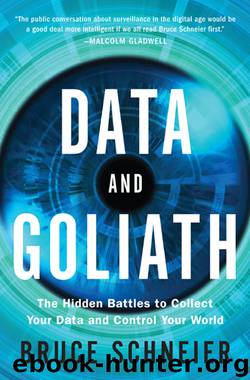Data and Goliath by Bruce Schneier

Author:Bruce Schneier
Language: eng
Format: epub
Publisher: W. W. Norton & Company
None of this will happen without a change of attitude. In the end, we’ll get the privacy we as a society demand and not a bit more.
DON’T WAIT
The longer we wait to make changes, the harder it will become. On the corporate side, ubiquitous tracking and personalized advertising are already the norm, and companies have strong lobbying presences to stymie any attempt to change that. California’s Do Not Track law is an example of that: it started out as a good idea, but was completely defanged by the time it passed. The natural trajectory of surveillance technology (remember the declining cost from Chapter 2?) and the establishment of a new status quo will make changes much harder to achieve in the future, especially in the US.
It’s not just corporations that oppose change. Politicians like the same data that commercial advertisers do: demographic data, information about individual consumer preferences, political and religious beliefs. They use it in their campaigns, and won’t want to give it up. Convincing them to forgo access to data that helps them with targeted messaging and get-out-the-vote campaigns will be tough. And once someone figures out how to use this data to make elections permanently unfair, as gerrymandering does, change will be even harder.
At a conference last year, I overheard someone saying, “Google Analytics is the crack cocaine of Internet surveillance. Once you see it, you never want to give it up.” More generally, data becomes its own justification. The longer we wait, the more people and organizations become used to having broad access to our data and the more they will fight to maintain that access.
We’re at a unique time to make the sorts of changes I recommend in this book.
The industries that collect and resell our data are powerful, but they’re still relatively new. As they mature and become more entrenched, it will be much harder to make major changes in how they do business.
Snowden has forced government surveillance into the spotlight by revealing the actions of the NSA and GCHQ. This has produced some singular tensions amongst the world’s countries, between Germany and the US in particular. And in the US, this political tension cuts across the traditional partisan divide. There’s an opportunity for real change here. As Chicago mayor and former Obama chief of staff Rahm Emanuel said, “You never want a serious crisis to go to waste.” That’s true here, even if most people don’t realize that this is a crisis.
We’re at a unique moment in the relationship between the US and the EU. Both sides want to harmonize rules about this sort of thing, to make cross-border commerce easier. Things could go one of two ways: Europe could become more permissive to match the US, or the US could become more restrictive to match Europe. Once those rules get equalized, they’ll be harder to change.
We’re also in a unique time in the development of the information age. The Internet is being integrated into everything. We have temporary visibility of these systems. We can make changes now that will stand for decades.
Download
This site does not store any files on its server. We only index and link to content provided by other sites. Please contact the content providers to delete copyright contents if any and email us, we'll remove relevant links or contents immediately.
| Comparative | Conflict of Laws |
| Customary | Gender & the Law |
| Judicial System | Jurisprudence |
| Natural Law | Non-US Legal Systems |
| Science & Technology |
American Kingpin by Nick Bilton(3886)
Future Crimes by Marc Goodman(3600)
The Meaning of the Library by unknow(2571)
Inside the Middle East by Avi Melamed(2356)
Why Nations Fail: The Origins of Power, Prosperity, and Poverty by Daron Acemoglu & James Robinson(2297)
On Tyranny by Timothy Snyder(2232)
Living Silence in Burma by Christina Fink(2071)
Putin's Labyrinth(2022)
The Mastermind by Evan Ratliff(1937)
The Smartest Kids in the World by Amanda Ripley(1856)
Think Like a Rocket Scientist by Ozan Varol(1821)
Law: A Very Short Introduction by Raymond Wacks(1748)
It's Our Turn to Eat by Michela Wrong(1731)
The Rule of Law by Bingham Tom(1698)
Philosophy of law a very short introduction by Raymond Wacks(1670)
Leadership by Doris Kearns Goodwin(1638)
A Dirty War by Anna Politkovskaya(1630)
Information and Communications Security by Jianying Zhou & Xiapu Luo & Qingni Shen & Zhen Xu(1621)
Civil Procedure (Aspen Casebooks) by Stephen C. Yeazell(1556)
